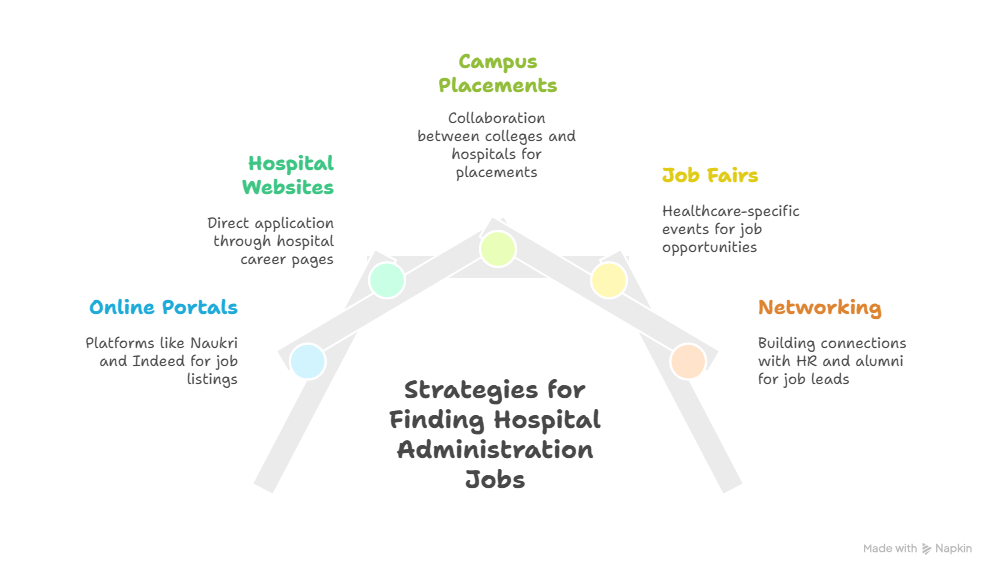Table of Contents
Hospital administration is a fast-paced and dynamic industry that plays a pivotal role in the functionality of healthcare systems. Right from managing day-to-day activities to patient care, it is the hospital admin experts who lay the foundation for any healthcare facility. In a state like Kerala that has one of the best healthcare systems in the nation, the demand for fresh, talented hospital admin experts is increasing geometrically. So, what do actual recruiters look for while recruiting freshers for hospital administration posts? Let us find out.
Get into Our Hospital Administration Course- signup for a free demo!
What Do Recruiters Expect from Hospital Admin Freshers?
Although recruiters are aware that new hires might not have any prior expertise in the field, they do anticipate a strong background in healthcare operations, initiative, and a desire to learn. The majority of companies want for people who are enthusiastic about managing healthcare, trustworthy in group environments, and able to professionally handle administrative duties.
Candidates who especially impress them include
- Be genuinely curious about healthcare systems.
- have completed volunteer or internship work in the medical field.
- understand the most recent developments in hospital administration.
- Show that you are prepared to handle multiple duties.
What Key Skills Do Recruiters Look for in Hospital Administration Freshers?
1: What is the primary role of a hospital administrator?
Recruiters are aware that freshmen in hospital management may lack years of experience, but their abilities may make all the difference. A candidate who is well-prepared and possesses the proper combination of soft and technical abilities has a higher chance of being shortlisted. Here is a thorough examination of the essential competencies that hiring managers actively seek out:
1. Proficiency in Communication
Hospital administrators have to communicate with management, suppliers, nurses, physicians, and patients. Both written and spoken communication must be courteous and clear for:
- Providing an explanation of policies or processes
- Working together with departments
- Resolving issues or complaints
2. Capabilities for Organization
Hospitals follow protocols, systems, and timetables. New hires with excellent organizing abilities can manage:
- Scheduling appointments
- Management of documents
- Monitoring of inventory
- Coordination of daily tasks
3. Fundamental Knowledge of Software and IT
Digital technology is used in hospitals nowadays for everything from patient records to invoicing. Recruiters like candidates who are acquainted with:
- Systems for Hospital Information (HIS)
- Office Suite by Microsoft
- Management of documents and emails
- Simple reporting and data entry
4. Interpersonal Skills
Hospitals are people-centered places. Recruiters want applicants who are able to:
- Perform effectively in groups
- Be kind with patients.
- Stay composed under duress.
- Develop positive relationships with both employees and guests.
5. Ability to Solve Problems
Making decisions in real time is common in hospital settings. Freshmen who are able to think quickly and handle little problems without always relying on seniors are highly regarded.
6. Time Management
Administrators frequently manage several duties in several departments. Effective time management and prioritization skills guarantee:
- Very little delay
- Improved coordination
- More efficient operations
7. Paying Close Attention to Details
Accuracy is important for patient records, invoicing, and compliance. Errors may be expensive. Recruiters are looking for new hires that are meticulous and attentive in:
- Records
- Handling reports
- Audits and data input
8. Basic Knowledge of Hospital Protocols
New hires are viewed as more employable if they are knowledgeable with infection control, medical terminology, healthcare ethics, and patient privacy regulations (such as HIPAA).
Hospital Administration Course with Assured Career Growth
Hospital Administration Course by Entri App: Master essential healthcare management skills, gain certification, and secure top roles in leading hospitals
Join Now!What Educational Qualifications Are Required for Hospital Admin Freshers?
To get a job as a hospital administrator as a new graduate, you usually need at least
- A bachelor’s degree in public health, hospital administration, healthcare management, or a similar area.
- A Master of Hospital Administration (MHA) or an MBA in Healthcare Management may be chosen by big hospitals because it shows that you have more skills.
- Some hospitals also look at degrees in Business Administration or Management that come with jobs in healthcare areas that are related to the degree.
Do Recruiters Prefer Certified Hospital Administration Candidates?
Yes, having the right credentials may help fresh grads get noticed. They indicate that you are committed to the work and might improve your CV, particularly if you’re just starting out.
These are some certifications that could be helpful:
- CPHQ stands for Certified Professional in Healthcare Quality.
- A degree in managing a hospital
- Courses that lead to certification in healthcare administration (from Coursera, Medvarsity, and other sites)
- Medical Office Administration Certifications
How to Apply for Hospital Administration Jobs in Kerala?
Kerala has a good network of hospitals, both private and run by the government. Here’s how new graduates can apply:
- Online portals: Naukri, Indeed, LinkedIn, and Monster India are some online job boards.
- Websites for hospitals: Look at the job sections of top hospitals such as Aster Medcity, Amrita Institute of Medical Sciences, KIMS Health, and more.
- Campus Placements: A lot of colleges that offer studies in hospital administration work with hospitals.
- Job Fairs: If you’re in Kerala, go to healthcare-specific job fairs or business expos.
- Networking: To get in touch with HR teams immediately, use LinkedIn or contacts made by grads.
Get into Our Hospital Administration Course- signup for a free demo!
Hospital Administration Course with Assured Career Growth
Hospital Administration Course by Entri App: Master essential healthcare management skills, gain certification, and secure top roles in leading hospitals
Join Now!Which Are the Best Courses to Boost a Hospital Admin Career?
In today’s healthcare system, which is changing quickly, hospital managers need to have a lot of different skills, know how to use technology, and be properly trained. Taking the right classes can help you improve your skills, find a better job, and make more money, no matter what level of administrative worker you are.
Here are some of the best courses in hospital management that will help your career:
Master of Hospital Administration (MHA)
- Gives a thorough idea of how hospitals are planned, run, budgeted, staffed, quality controlled, and legally compliant
- Helps people get ready for top positions in healthcare centers
MBA in Healthcare Management
- Perfect for top jobs in hospital groups, insurance firms, and health startups
- Strategy, finances, and business get a lot of attention.
Post Graduate Diploma in Hospital and Health Management (PGDHHM)
- Centered on the industry, adaptable, and useful
- Deals with HR, public health, patient care, and management.
Diploma in Hospital Administration
-
Teaches how hospitals work, how to bill, basic legal issues, and how to keep medical records
-
Cheap and easy for newbies to get to
Health Informatics & Digital Health Courses
Pay attention to EMR, EHR, telemedicine, data management, and hospital management tools. Coursera, edX, and WHO Academy all offer it.
Certification in NABH Standards / CPHQ / Six Sigma
People who want to work in hospital quality, safety, or accreditation jobs.
Most Popular Choices:
- NABH Assessor Training—Learning about how Indian hospitals get accredited
- If you want to be a Certified Professional in Healthcare Quality (CPHQ), you can.
- Lean Six Sigma in Healthcare— It cuts down on mistakes and boosts productivity
International Healthcare Management Courses (Online)
Good for workers who want to improve their skills from home.
For example:
- Certificate in Healthcare Management (University of Washington – edX)
- Managing a medical office (Udemy)
- Certificate in Hospital Administration (Alison)
Final Thoughts
Although it might be difficult for newcomers to enter the hospital administration profession, it is completely achievable with the correct attitude, training, and abilities. In addition to degrees, recruiters are searching for driven, well-organized, and competent people who can help a hospital run well. Freshmen may enter the healthcare industry with confidence and build a prosperous career by emphasizing essential skills, certifications, and ongoing education.
Get into Our Hospital Administration Course- signup for a free demo!
Hospital Administration Course with Assured Career Growth
Hospital Administration Course by Entri App: Master essential healthcare management skills, gain certification, and secure top roles in leading hospitals
Join Now!Frequently Asked Questions
Can I take hospital administration courses online?
Yes! Many platforms like Coursera, edX, Medvarsity, and Alison offer online certificates and diplomas in hospital administration and health management.
Do I need a healthcare background to study hospital administration?
Not always. Many courses are open to graduates from any stream, especially if they show interest in healthcare management.
Can hospital admin courses help me get a job abroad?
Yes. Courses like CPHQ or Healthcare Management certificates from global universities can enhance your chances of working in hospitals abroad, especially in the Middle East, UK, and Canada.
. Are government jobs available for hospital admin professionals?
Yes, in public health departments, government hospitals, ESIC institutions, and health missions like NHM or Ayushman Bharat.
Is internship experience necessary after completing the course?
Yes, internships are highly recommended. They provide real-world exposure to hospital workflows and increase your job readiness and recruiter interest.
Do government-recognized certifications matter?
Definitely. Recruiters prefer certifications and diplomas from UGC-approved universities, medical councils, or healthcare training boards, as they carry more weight in both the private and public sectors.












